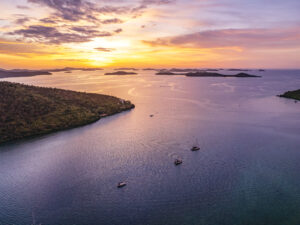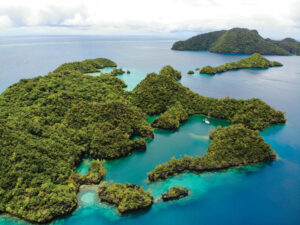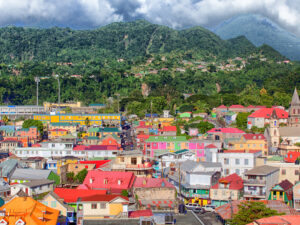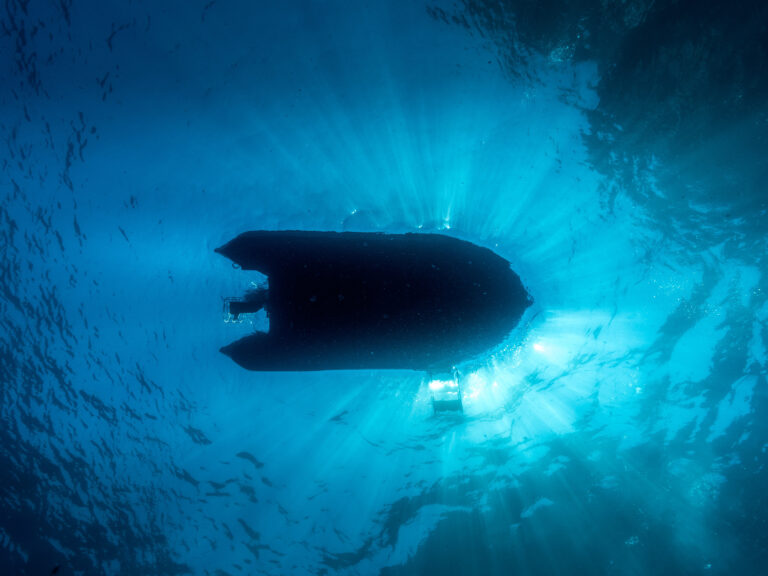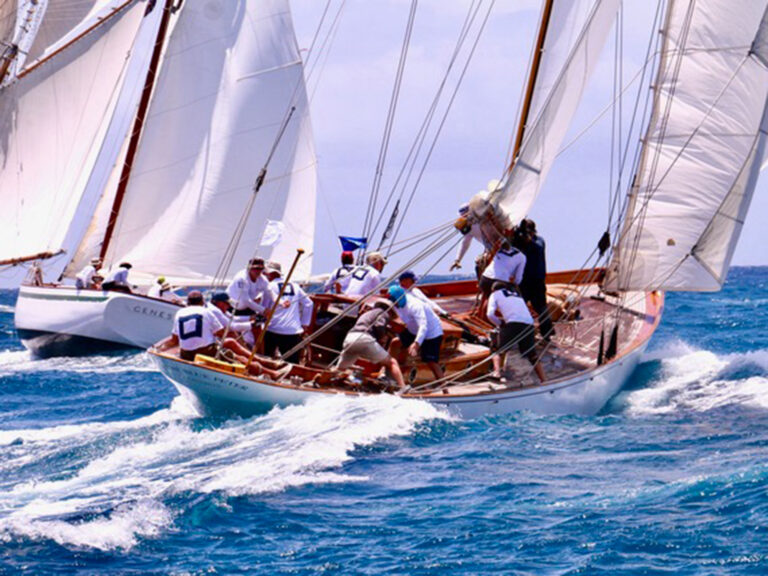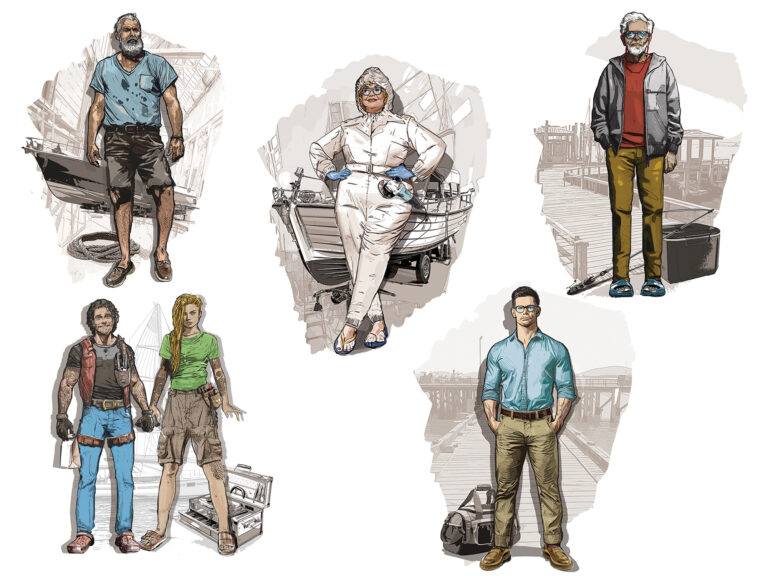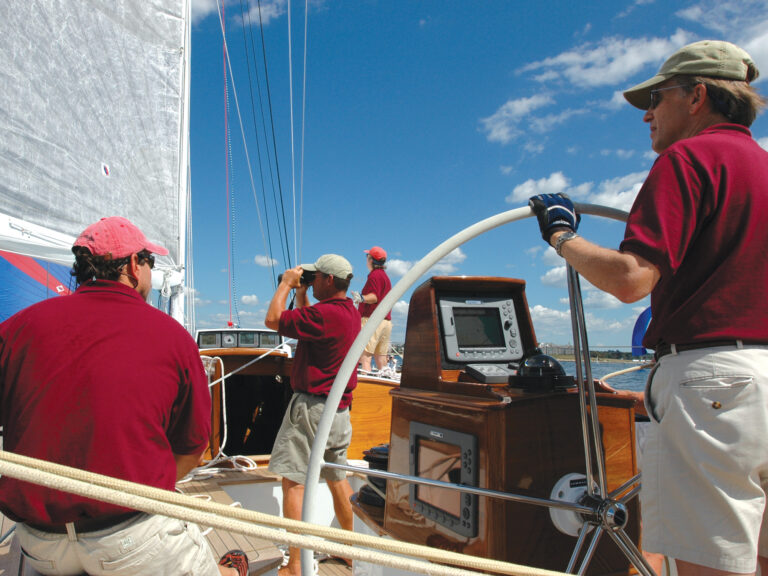As cruisers, we often have the privilege to watch what’s happening in communities at the edge, as they struggle with their transitions between an old world and the new. Nargana is one of those. No longer a traditional Kuna village, Nargana is tumbling into an orbit of modern mores, gaining advantages and simultaneously losing some of its distinctive flavor. Once a sleepy village with an all-powerful saila, the town’s control has been nibbled away by the superior forces of economics and escalating aspirations. Today, only some of the women dress traditionally, and a smaller percentage of the younger girls.
| | The skyline of metropolitan Nargana, a sleepy little burg hanging on to the edge between their Kuna tradition and rush of mainland influence* * *|
Many of the young men go off to Panama to work, and the Nargana pace—not pell-mell by North American standards—is a rocket ship in comparison with more remote, self-sufficient island villages that lack electricity and organized commerce. This is a community that’s crossed a brink, and now the press of inertia is compelling redefinition. There’s a bank here with guards and guns, and a row of three public telephone booths. There’s a clinic with a part-time doctor and a school with a full-time teacher! The man from whom we buy eggs has a son in the United States. Both he and his boy are avid Red Sox fans, but, “siempre triste,” he tells me—always sad. These are men who understand their distant team.
| | Nargana has phones, but either they didnt work at all, or we couldnt get a connection out of the countrya typical problem in Central America.* * *| Theres an airfield here, and when the weathers good, flights come from and leave for Panama City every day at 6:30 am. (Round trip is $58; many cruisers fly out for a day, do major provisioning for several boats and return with cartons of goodies the next morning.) The Red Lobster planeits actually redflies over every couple days, and if the white flag is raised on the pole at the runway, it circles and dips in for a pick up. The pilot in the little one-seater attaches his scale to a wing strut, buys all the lobster he can, pays the Kuna fisherman, and within minutes hes off to the next airstrip. There are a series of them along the mainland coast, built by the US military when they were training troops here for jungle warfare.
| | The Red Lobster plane, a familiar sight throughout the San Blas. The restaurant chain buys all the lobsters they can, flies them to Panama City via this little plane, then jets them to the United States.* * *| Like all towns on the grow, Nargana is a beehive of incongruous construction. Cement houses and bamboo huts are going up right next to each other. Dirt is being tamped down on the streets. There are no cars, no public water distribution, and no sanitation system, but theres a town generator now20 hours a day of noisy motor. Antennas and satellite dishes are sprouting from trees and thatch.
The center of town has a soulful, smooth warmth with kids playing in the streets; cats and dogs running wild; the sound of dominoes being slapped on weathered boards, but the edges are rougha serrated line of outhouses, small buildings that dump directly into the bay beneath them. And the shore is crusted everywhere with contemporary detritus, mostly plastic that wont rot for millennia. Its part of the tension in transformation. Not so long ago, when everything was biodegradable, there wasnt a problem throwing it all into the sea, but habits die hard, and in the crush of modernization, theres more packaging, more long-life rubbish, and no plan or place for its destruction. All cultures struggle with what to do with their trash, but in technologically sophisticated societies, we find more places to hide it. In Third World villages, inevitably its in your face.
| | The little shore of Nargana is lined with outhouses built on stilts over the water.* * *| To get good fresh water, everyone relies on _ulus_some of them 30 feet long and others only 6 or 8. Loaded with all manner of containers, boys and men paddle them up the shallow Rio Diablo River to a point beyond where the tide can reach. There the water is clean and pure, and everyone fills up. Including us. We filter it twice, purify it mildly with chemicals and drink it happily, with no ill effects.
Nargana is home to Federico and Soledad Morales and their family. Hes an institution among cruising sailors in this area, and Soledad, by virtue of being married to him, someday could be nominated for sainthood. Their hut and outhouse are right on the water near the anchorage, and he flies a torn and faded, once-orange flag that formerly said “Yacht Services.” Hell find most anything for you: food, fuel, packages on an airline, ticketswhatever you might want. If its exotic, hell call a buddy in Panama City, who sometimes can track it down and have it shipped out. Federicos known for his capricious pricing program, and some folks dont trust him at all. But hes always played square with us, and weve become fond of each other, although this in no way diminishes his enthusiasm for squeezing for every centavo he can, which he does with masterful charm.
| | Federico and Soledad Morales* * *| For more than 10 years, Federicos been the man the yachties rely on here. I dont know how many children he has, (maybe he doesnt either) because anyone who asks may get a different answer. I saw four and he mentioned two or three others. The youngest, a three-year-old, has massive scars that ring his body like a girdle, from chest to knees, including his buttocks and penis. Some accident occurred when he was a baby”_fuego, Señor Douglas, malo fuego_.” (Fire, Douglas, bad fire.) The boy has other problems as well; he speaks not a word and growls, pawing at his mother or sister constantly. I dont know if his difficulties are organic or the result of the trauma, or both. Either way, his parents and siblings have their hands full.
I quite like Federicos toothless, lecherous grin, and his general air of rascality. I walk with him around town, and he helps me find fruit, eggs, chicken, spaghetti, tomatoes, potatoes, garlic, onions, cucumbers, peppers, celery, cabbage, and fresh bread. Kuna loaves resemble mini-baguettes and cost 5 centavos (a US nickel) apiece. The tiny tiendas we stop in are all specialty boutiques: some of them may have only potatoes and plastic buckets, while others limit themselves to eggs, soap and tomatoes. Theyre restocked several times a week from trading boats that motor up from Cartagena, and then return laden with San Blas coconuts.
| | Supply boats carrying fruits and vegetables come in to Nargana almost every day from Colombia. When you see one dock, you dinghy in, and buy your produce directly from the crew.* * *| In our walkabouts, Federico steers me away from some tiendas and toward others. No doubt theres some baksheesh equation to which Im not privy. As we amble through town, over the little bridge to see his cousin whos a baker, he pinches every bottom he can get near. Some behavior is not culturally determined. Its pure gender. On our last day there, I wanted to make sure I got a good photo of him and Soledad, so I dinghied in about 7 am. His kids were inside their bamboo hut, sitting on a wet, dirt floor watching cartoons on a scratchy television. He was outside under the _palapa,_ reading his Bible.
| | The “Father Of Education”* * *| There are now two restaurants in Nargana. Each serves fish, lobster, crab, beans and rice, but Albertino makes pizza. Pepperoni Pizza! And good pizza at thatan extraordinary treat after being out on the reefs for several weeks. We were there this week and paid $6.75 for a pepperoni and chicken combo, which is about $6 more than wed pay out on the reef for enough fish for two dinners, but pizza was a siren call that couldnt be ignored. Albertino sat at the table next to us, practicing with his Spanish-English lesson book, and we drank beer, wolfed down his pizza, and practiced our Spanish with him, trading sentences back and forth. Hes a clever entrepreneur, and with the only pizza concession in town, hell surely prosper. On our last night there we heard a gaggle of laughing women in the thatched hut next door. They were playing bingo.
Nargana is actually two islands connected by a bridge. And the airport runway (Corazon de Jesus) is on a little peninsula that’s part of the mainland. Passengers get back and forth in wooden ulus. The main square of the larger island has a statue of Carlos Inaediguine Robinson, the father of the movement to educate Kuna children. He’s a proud-looking man holding a book. A block away there’s a house with a sign for the local attorney. You know a village is changing when there’s sufficient demand for a full-time lawyer. Every afternoon in the school yard there are continuous volleyball and basketball games, and everywhere there are children with soccer balls, bouncing them on their knees and elbows, practicing headers off Señor Robinson.
| | Federicos collection of cards from passing cruising boats* * *| Nargana is not somewhere cruisers hang out for long stretches. We come in and anchor long enough to pick up supplies. Theres no deep-water dock for diesel, which is fine with me, because Im terrified of driving _Ithaka_ up to docks, and prefer to get my fuel in jerry jugs and dinghy them back. Paco has the monopoly on both the diesel and gasoline markets on Nargana, which makes him a wealthy man. Hes a retired Panamanian soldier who has not relinquished his officers bearing, but softens it with a contagious smile and wily laugh, as he always miscounts your change, chortling and apologizing as he makes it good second time around. Paco will fill his own diesel jugs and deliver them to the yachts, but most people want to see the juice before trusting it to their engines, so hes happy to permit inspections in his yard.
The other day there were two of us there, checking the diesel and using our Baja funnelsaluminum, three-stage filters that progressively catch finer and finer particles and hopefully water too. I dont know any cruiser who doesnt use one religiously. Paco makes every effort to keep his fuel clean. Its all in large plastic (not metal) 55-gallon drums sheltered by several layers of plastic, tin, and an old carpet to weight it all down. So far weve had no problems with fuel weve purchased here, but I know I risk all in saying so. Pacos diesel prices fluctuate between $1.75 and $2 a gallon, depending on his mood and your negotiating skills.
| | The gas dock at Pacos* * *|
Its not only the price of fuel thats in flux. If change were easier, wed all be vastly different people, and our societies would be easier, gentler places. Some of the gifts of modernity are precious: better medical treatment, fewer cases of unnecessary tropical blindness, a lower infant-mortality rate, a chance for children to be educated and dream differently. But the prices are real too: the loss of a slower, milder day; the introduction of pollutions; the piling up of refuse; the confusions and conflicts over what its right to covet and reach for.
| | Evidence of the modern worlds first infiltration of Kuna Yalaa satellite dish on a thatched Kuna hut in Nargana.* * *| The people of Nargana are caught in limbo, no longer so tightly tethered to their old world, but not fully planted in the new. I suspect some of their expectations and temptations are inflated while others collapsed, and all of it happens in the shadow of televisions blue light, illuminating the world inside their bamboo huts. Choices always complicate things.
e-mail the Bernons: Ithaka@CruisingWorld.com


